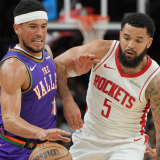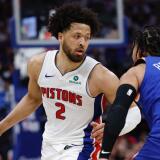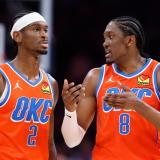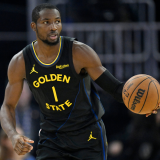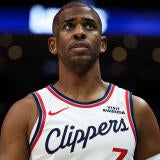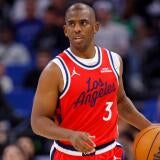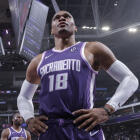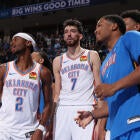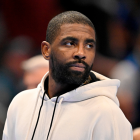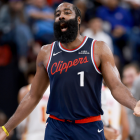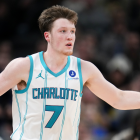NBA Most Improved Player odds: Best bets at every tier and why the Thompson twins are both favorites
We're looking at the wide-open field for MIP
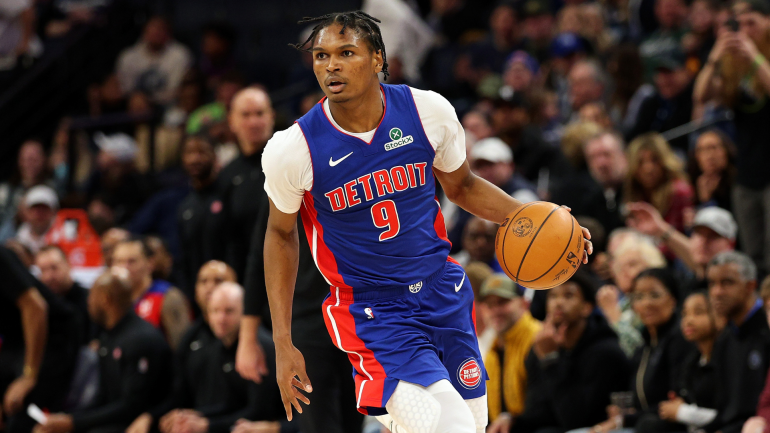
Kudos to Dyson Daniels on breaking one of my least favorite streaks in the NBA. Last season, he won Most Improved Player without making the All-Star team. The last player to do so was Pascal Siakam, and he and CJ McCollum are the only active players to win the award without also having made the All-Star Game for the first time in that season. With Ivica Zubac finishing second, the only first-time All-Star to even finish in the top five was Cade Cunningham in third place.
Could Daniels represent a change in how the electorate perceives this award? That will take years to play out. What we can note for now is that we had six first-time All-Stars last year along with three second-time All-Stars and three third-time selections. In other words, many of the young players who had been blocked out by older stars in the past have already broken through. There certainly could be a new crop of first-timers this season, but there are fewer logical candidates for that than usual.
So without the first-time All-Star marker as our north star, what are we looking for in a Most Improved Player? Timing is the starting point. Seven of the last 15 awards have gone to third-year players, and four of the remaining eight have gone to fourth-year players. No second-year player has won the award since Monta Ellis in 2007. We're therefore looking for players at the end of their rookie deals, and as 17 of the past 18 winners have been first-round picks, we're looking primarily at a 60-player group: the first rounds of the 2022 and 2023 NBA Drafts.
Even within those groups, we can trim the fat further. Knock out three players for already having made All-Star teams (Paolo Banchero, Jalen Williams and Victor Wembanyama), 10 more for not having full-time roster spots (Johnny Davis, AJ Griffin, David Roddy, Marjon Beauchamp, Wendell Moore, Patrick Baldwin, TyTy Washington, Jalen Hood-Schifino, Olivier-Maxence Prosper and Nick Smith) and we're already down to 47 before even considering team circumstances and individual performance through two years. The majority of candidates we will seriously consider will come out of that pool of players.
But for the moment, we'll keep the field open. Below, we'll break down the odds for Most Improved Player into three tiers: the favorites (those with odds of +2000 or shorter), the middle of the pack (odds between +2000 and +4000) and the long shots (+4000 and beyond) to try to figure out where the best betting value lies in this always contentious market.
Big news, NBA fans. The all-new DraftKings promo code gives new users three free months of NBA League Pass and $300 in bonus bets with a winning $5 wager. Get started here. NBA League Pass lets you watch out-of-market NBA games, live and on demand. NBA League Pass users can also use multi-view features to stream multiple games at the same time, making it even easier to watch your favorite players, teams, NBA bets, or Fantasy basketball lineups. Claim your offer now:
The favorites
There are only four players in this tier. For reasons we'll explain shortly, we're going to hold off on covering one. There is another I'm less interested in: Andrew Nembhard (+1200). There is another Pacer that offers more value down the line. The difference between Nembhard's regular-season 3-point shooting (33.5%) and playoff 3-point shooting (47.3%) has thrown people off of his night-to-night value a bit. Unless you believe he's going to shoot like he does in the playoffs, he's just not going to score enough to realistically factor into this race.
So that leaves with two candidates I do like, and they happen to be brothers: Amen Thompson is the favorite at +900, while Ausar Thompson isn't far behind at +2000. The logic for Amen is obvious. With Fred VanVleet out, the ball is going to be in his hands far more than it was a year ago, and with Kevin Durant in place and Reed Sheppard likely to get more minutes, Houston should have more space to operate with offensively. That's a formula for Thompson to get to the basket quite a bit and rack up both points and assists, which in turn is a formula for a first-time All-Star selection if the Rockets are as good as we expect them to be. If that's how this plays out, he's an obvious candidate.
As for Ausar, we're cheating a little bit. We saw Amen break out in his second season, but Ausar missed the beginning of his sophomore campaign because of a blood clot. He worked his way into a starting role midseason, but the theory here is that he's due for a breakout similar to his brother's with his role now assured and a full training camp to get ready. He won't have the ball as much as Amen, but the bar here is lower as he isn't starting with the same expectations. Ausar was terrific down the stretch last season and should be able to build on that success now.
The middle of the pack
We mentioned a player in the first category that we were skipping over. That would be Deni Avdija (+1700). We did so because there are two other Blazers with reasonably short odds that also needed to be covered, so we're going to lump them together. Shaedon Sharpe is at +3000, while Scoot Henderson is at +4000. The theory here is that Portland's defense is going to be good enough to make the Blazers at least a play-in-caliber team. Therefore, if one of these players breaks out on offense, they could compete for a true playoff spot.
Avdija having the shortest odds doesn't make much sense to me. For starters, his breakout has sort of already happened. He was terrific down the stretch, and when his shot is falling, he's a very good offensive player. But he's much more of a secondary creator than a primary offensive option. Portland's long-term hopes hinge on the more athletic and higher upside Henderson and/or Sharpe taking a major leap. I think both could be good bets, but in different ways. If you want to bet one now, bet Sharpe. He has reportedly been a training camp standout. Henderson is recovering from a hamstring injury and will miss the beginning of the season. You'll get much better odds if you wait until his odds drop ahead of his return. Someone is going to become the early favorite here, and Henderson, without playing, will become a long shot.
As for the rest of this group, I'm immediately ruling out Matas Buzelis (+2000) and Reed Sheppard (+2200) for being second-year players. Josh Giddey (+3000) and Payton Pritchard (+3500) are both a bit more interesting for reasons that extend beyond their ages. Both are going to have the ball more than ever this season. Giddey averaged 20 points, 8.5 assists and 9.9 rebounds after the Zach LaVine trade last year. If he does that over the full season while shooting anywhere close to the 45.3% he nailed from 3-point range in that stretch, he's going to finish near the top of the ballot. Even if the 3-point shooting predictably dips, he can make up for it with more volume. The same is true for Pritchard, who is playing without Jayson Tatum, Jrue Holiday and Kristaps PorziÅÄ£is ahead of him in the pecking order. Do I expect him to post All-Star-caliber stats in a role with unlimited freedom? Probably not. But the value here isn't crazy.
Outside of Sharpe and perhaps Giddey, my favorite player in this tier is Bennedict Mathurin (+2500). Mathurin has always been an odd fit in Indiana's free-flowing system. He wants the ball in his hands and to operate like a more traditional star scorer. We saw the volatility of that style in the playoffs, when he seemingly was either great or invisible with no in-between. Well, now that Tyrese Haliburton is out, Indiana badly needs someone to take on a high-volume scoring role. Mathurin, in a contract role, will eagerly oblige.
The final two players in this range are Michael Porter Jr. and Jonathan Kuminga, both at +4000. I'm out on both. Kuminga may be great when he's inevitably traded, but he won't get enough minutes before that to realistically factor into this race. The theory for Porter is that, on a normal bad team with the ball more than he had it in Denver, he could break out as the high-usage scorer he was meant to be as a prospect. Frankly, nothing that happened in Denver suggests he's a capable enough ball-handler to be a 25-point scorer consistently. That's the bar, and I can't see him reaching it.
The long shots
We're going to split the long shots into two groups. The first are plausible first-time All-Stars. The second is players due for massive role increases after having toiled in obscurity.
For the first group, we have four names: Trey Murphy (+5000), Jalen Johnson (+6000), Coby White (+6000) and, I can't believe I'm saying this, Deandre Ayton (+20000). Let's get the obvious out of the way: I don't remotely suspect Ayton to actually be an All-Star. I'm just playing the narrative game on incredibly long odds. If the Lakers are awesome and he looks more like he did in Phoenix, there will be a groundswell of support behind him similar to the one Julius Randle received when he won in 2021. The model here is basically Ayton being a model citizen, playing great defense, setting screens, getting to the line more and benefitting from the great playmaking he'll have in Los Angeles. I don't think he'll ultimately compete for this award, but I can't ignore the chance at 200-to-1.
The other three are much more plausible. White posted All-Star scoring numbers in the second half of last season. Johnson would have been an All-Star last year if he hadn't gotten hurt. But Murphy is my favorite player in that group as he can scale up if Zion Williamson gets hurt or play well off of him if he doesn't. He flashed star upside last season when injuries made him the primary option for a stretch, and he's a nerd favorite, so if he plays like he did at his best last year, there is already baked in support.
And then there are the the less obvious breakout candidates. Here, we have three names: Jay Huff (+5000), Neemias Queta (+6000) and Jarace Walker (+15000). We obviously have two Pacer front court players here. One is a former No. 8 overall pick whose been buried on the depth chart but looked good in small doses. The other is a per-minute darling with the skill set best suited to replace the bulk of Myles Turner's role. Either are solid choices. Queta, simply by virtue of jumping from a bit player to a possible starter on a high-profile team, is going to get some buzz early in the season if he plays well. He's not Boston's traditional center archetype as a rim-runner rather than a shooter, but the Celtics have so much shooting still in place that he should be able to benefit from plenty of easy buckets.
And there's one unusual candidate that I want to mention. In our MVP odds preview, I mentioned Alperen Sengun as a 300-to-1 long shot I liked. For the same reasons, I want his MIP odds at +10000. One of Houston's young players is about to take a big leap just by virtue of the extra touches available without Fred VanVleet. We covered Amen Thompson already. Well, if you're a Thompson bettor, you basically have to hedge Sengun as well in case he's the one who shines in VanVleet's absence. Sengun was one of the best players at EuroBasket, drawing notable comparisons to Nikola JokiÄ. It's not likely as he's already made an All-Star Game, but there's a world in which he takes a very significant, All-NBA leap, and there are voters who tend to reward that sort of leap.


